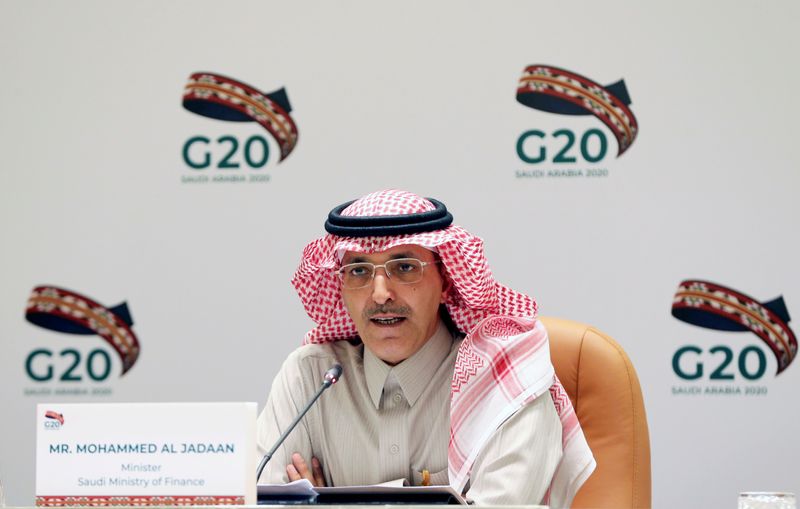By Marwa Rashad and Davide Barbuscia
RIYADH/DUBAI (Reuters) - Saudi Arabia's central bank foreign reserves fell in March at their fastest rate in at least 20 years and to their lowest since 2011, while the kingdom slipped into a $9 billion budget deficit in the first quarter as oil revenues collapsed.
The world's largest oil exporter is suffering from historic price lows, while at the same time measures to fight the new coronavirus are likely to curb the pace and scale of economic reforms launched by Crown Price Mohammed bin Salman.
The Saudi Arabian Monetary Authority said late on Tuesday its net foreign assets, which include securities such as U.S Treasuries and foreign deposits, fell in March to $464 billion(373.86 billion pounds), their lowest in 19 years.
The nearly $27 billion decline - the biggest monthly drop in at least two decades - signals the kingdom's urgent need to tap into reserves to offset economic damage from oil prices and a severe coronavirus-driven slowdown of non-oil sectors.
"We believe that the magnitude of the drop ... reflected both higher government funding to cover the budget deficit and the support packages announced in March to help counterbalance the impact of COVID-19," said Monica Malik, chief economist at Abu Dhabi Commercial Bank (ADCB).
Finance Minister Mohammed al-Jadaan said last week the kingdom would limit its draw down to a maximum of $32 billion from reserves this year to fill a widening deficit which it plans to cover instead by increasing borrowing to nearly $60 billion.
Early on Wednesday the finance ministry reported a first quarter budget deficit of $9 billion, mostly because of a drop in oil revenues that reversed a first quarter surplus of around $7.4 billion in 2019.
Oil revenues in the first three months of the year posted a 24% annual decline to $34 billion and pushed total revenues down 22% year on year.
Saudi Arabia, which had registered more than 20,000 coronavirus cases as of Tuesday with 152 deaths, had originally projected a $50 billion deficit this year, or 6.4% of gross domestic product (GDP), widening from around $35 billion last year.
Jadaan has said the deficit could now widen to up to 9% of GDP this year, but some analysts have predicted 22% with oil prices at $30 a barrel.
PRICE PLUNGE
International oil prices (LCOc1) have shed around two thirds value since the start of this year and are trading around $21.
"If Finance Minister al-Jadaan's plans are for merely $32 billion of reserves drawdown then, following a $27 billion reduction in March alone, that means almost all the remainder will be covered by new sovereign debt issuance, assuming there are no further privatisations, because of market conditions," said Hasnain Malik, head of equity strategy at Tellimer.
Saudi Arabia and other large producers recently agreed to cut output by almost 10 million barrels per day (bpd), in May-June, in an attempt to balance the market, but demand kept falling nonetheless due to the global slowdown.
Jadaan said last week he expects the pandemic to cause a slump in activity in the non-oil private sector too this year and that the government could take more actions on top of $32 billion in emergency stimulus measures announced last month.
Private sector loan growth, however, was solid in March, central bank data showed, "potentially reflecting the higher borrowing requirements of corporates with COVID-19 impacting cash flows," said ADCB's Malik.
Non-oil revenues in the first quarter fell 17% compared to the same period one year earlier, with revenues from taxes on goods and services plunging, in a sign of overall slowdown.
Saudi Arabia has already cut its 2020 budget by nearly 5% and further spending curbs are likely.
In Q1, however, capex spending declined only 4%, the finance ministry said.
Riyadh last month raised its debt ceiling to 50% of GDP from 30%. It has already borrowed $12 billion in international bonds this year.

($1 = 3.7600 riyals)